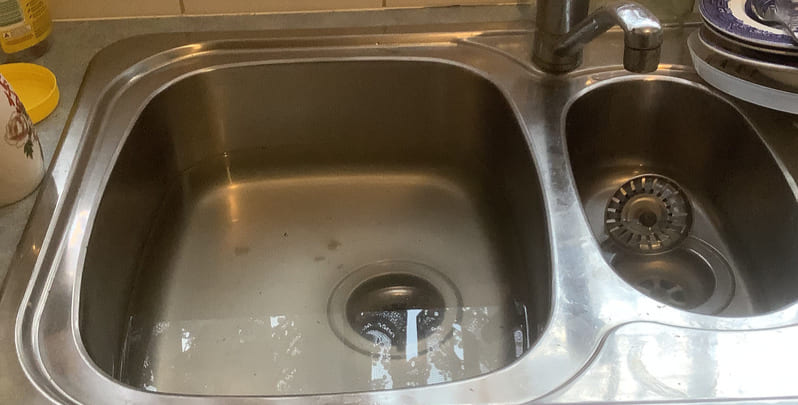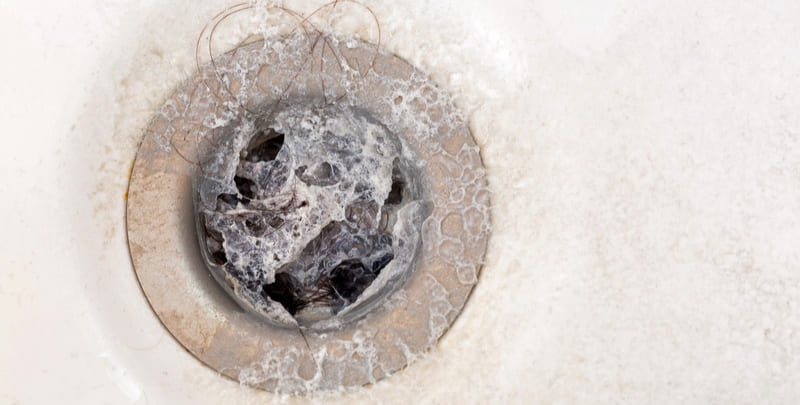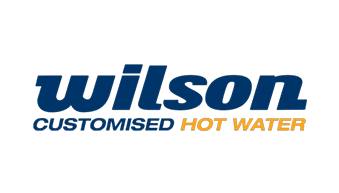
4 Tips to Prevent Blocked Drains
If there is one common plumbing issue in your home that needs urgent attention, it’s the blocked drain. Keeping your kitchen and bathroom drains clear is crucial to maintaining a functional plumbing system and avoiding costly repairs.
Blocked sinks, clogged drains, and other debris build-up can disrupt water flow and potentially damage your pipes. Which is the last thing you want.
This blog will cover essential practices to prevent blockages from everyday substances like food particles, coffee grounds, and grease build-up. We’ll also look at some effective ways to tackle a clogged drain.
By adopting these practices, you can ensure your drainage system remain clean and clear. In doing so, you can prevent the inconvenience of blocked toilets and sinks and maintain a healthy and happy home.
Tip 1: Proper Waste Disposal
Proper waste disposal is key to preventing blocked sink drains and ensuring your plumbing system remains unobstructed. Many common kitchen and bathroom items can cause drain blockages if not disposed of correctly. Here are some essential guidelines to help you manage waste better and keep your drains clear.
Preventing a Blocked Drain in the Kitchen
- Never pour food waste, including coffee grounds and grease, down the sink.
- Scrape up any used grease and dispose of it in the rubbish.
- Dispose of any food scraps in the bin or use them for composting instead of clearing them down the drain.
You might think that boiling water might loosen up grease and make it move through your drainage system easier. That’s not the case – grease can still solidify in your plumbing and cause severe blockages. It’s best to not even entertain the thought of disposing of it that way at all.
Preventing a Clogged Drain in the Bathroom
Avoid flushing sanitary products, wet wipes, and other foreign objects down the toilet. They do not break down easily, if at all, and can cause a blocked toilet. Even products labelled as flushable can lead to problems in your plumbing system, resulting in the need for emergency plumbing services.
For both kitchen and bathroom sinks, using drain screens can catch debris like soap scum and prevent it from entering the drain hole, thereby reducing the risk of drain blockages. Regularly cleaning these screens can help maintain effective water flow and prevent build-up.
Outdoor Drains
With any outdoor drains, be vigilant about clearing leaves and debris that can accumulate and cause blockages. You can use an unravelled wire hanger or a simple drain auger to clear these drains periodically – it will ensure that rainwater flows away from your property without hindrance.
By adhering to these waste disposal tips, you can keep your plumbing system efficient and reduce the likelihood of needing costly repairs due to blockages.

Tip 2: Be Smart with How You Use Water
Efficient water use in the kitchen is not only environmentally friendly, but it can also prevent plumbing issues associated with blocked drains. Here are practical steps to ensure you’re using water efficiently, thereby reducing the chances of drain blockages:
- Install water-saving fixtures: Consider replacing old taps with water-saving ones that use aerators. These devices mix air with water, providing good water pressure while reducing overall water usage. Lower water flow means less pressure on your pipes and a reduced chance of a blocked sink drain.
- Manage dishwashing water: Be mindful of how much water you use when washing dishes. Avoid running water continuously as you rinse. Instead, fill one basin with soapy water for washing and another with clean water for rinsing. This reduces water usage and the amount of waste water that needs to be managed by your drains.
- Regularly check for leaks: A dripping tap or a leaking pipe can not only waste water but also lead to more significant issues over time. Among those issues are water damage and mould growth, which can exacerbate drain blockages. Regular broken pipe checks and timely repairs can prevent these problems.
- Use a dishwasher wisely: If you use a dishwasher, be sure to load it fully before running it. This maximises efficiency and reduces the number of cycles you run, thereby saving water and reducing the load on your drainage system.
- Educate household members: Make sure that everyone in your home understands the importance of conserving water and preventing blockages. Simple habits like turning off the tap while scrubbing dishes can make a big difference.
By implementing these water-efficient practices, you can maintain the longevity and efficiency of your home’s plumbing system. This proactive approach can save you from unexpected plumbing emergencies and costly repairs due to blocked drains.
Tip 3: Regular Cleaning and Maintenance
Keeping a regular maintenance schedule for your drains is vital to preventing blockages and ensuring your plumbing operates efficiently. Here are some simple cleaning practices that can help keep your drains clear without resorting to potentially damaging caustic cleaners.
- Boiling water – An effective measure in either the kitchen or the bathroom. Pouring boiling water down the kitchen sink once a week will help dissolve fatty substances and food debris that might have built up. It will also help to break up any built-up soap scum or accumulated hair in the bath or shower drain.
- Wire hanger – Take a wire coat hanger. Straighten it out but leave the hook part at the end. This can be an effective tool for fishing out debris from the drain. Regularly doing this for your shower or bathroom sink can prevent severe drain blockage that leads to slow water drainage and gurgling sounds.
- Baking soda and vinegar – A homemade drain cleaner made from one cup of baking soda followed by one cup of vinegar. This natural combination causes a fizzing action that helps to naturally clear minor blockages. After letting it sit for an hour, flush the drain with hot water to rinse away the loosened debris.
It’s important to be proactive about checking for signs of more serious issues, such as broken pipes or the need for pipe relining. Early detection can keep your drains flowing smoothly and save you from more significant, costly repairs in the future.
Tip 4: Use Drain Guards
Installing drain guards in both kitchen and bathroom sinks is a proactive step towards preventing drain blockages. In the kitchen, a drain guard can stop food particles and other solids from slipping through. In the bathroom, they are effective for catching loose hair that can otherwise cause clogged drains.
The Importance of Maintenance
Regular maintenance of your drain guards is crucial in preventing the accumulation of debris that can lead to more severe blockages. Clean them regularly to ensure they can do their job effectively. This involves:
- removing the guard
- discarding the collected debris, and
- rinsing the guard under running water
By using drain guards, you not only prevent blocked drains but also reduce the need for aggressive methods like chemical drain cleaners. Simple, cost-effective, and easy to maintain, drain guards are a must-have in every home to keep your drains flowing freely.

Effective Methods for Clearing Blocked Drains
One common DIY solution to clear a blocked drain is the combination of baking soda and vinegar. It’s a combination that can help dissolve minor blockages without the harshness of chemical drain cleaners. Pouring hot water down the sink regularly can also prevent the accumulation of fatty substances that lead to clogged pipes. These simple steps are easy to incorporate into your daily routine and can significantly reduce the risk of developing major blockages.
For unblocking drains caused by more stubborn blockages, tools such as a plumber’s snake or a DIY drain snake made from a straightened wire coat hanger can be effective. These tools can remove debris from the u-shaped pipe under the sink, often without needing a professional plumber. However, to clear blocked drains caused by tree roots, broken pipes, or severe grease build-up, you will absolutely need a licensed plumber.
Clear Drain Blockages Before It’s Too Late!
Adopting these simple yet effective tips will greatly reduce the likelihood of encountering a blocked drain in your home. Regular practices like proper waste disposal and the strategic use of drain guards can prevent the common causes of drain blockages and keep your plumbing system running smoothly.
Remember, the key to clearing blocked drains and avoiding clogged drains lies in proactive maintenance and mindful usage. By taking these preventative measures and knowing how to clear a blocked drain, you can ensure that your drains stay clear, saving you from the inconvenience and potential expense of emergency plumbing repairs.
Please note: This information is provided for advice purposes only. Regulations differ from state to state, so please consult your local authorities or an industry professional before proceeding with any work. See our Terms & Conditions here.
Published: 2024-04-30

















